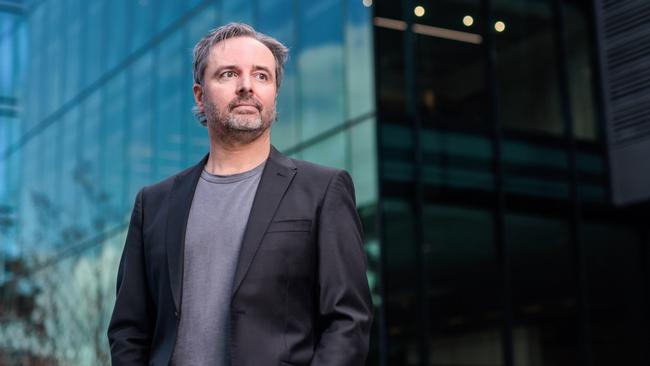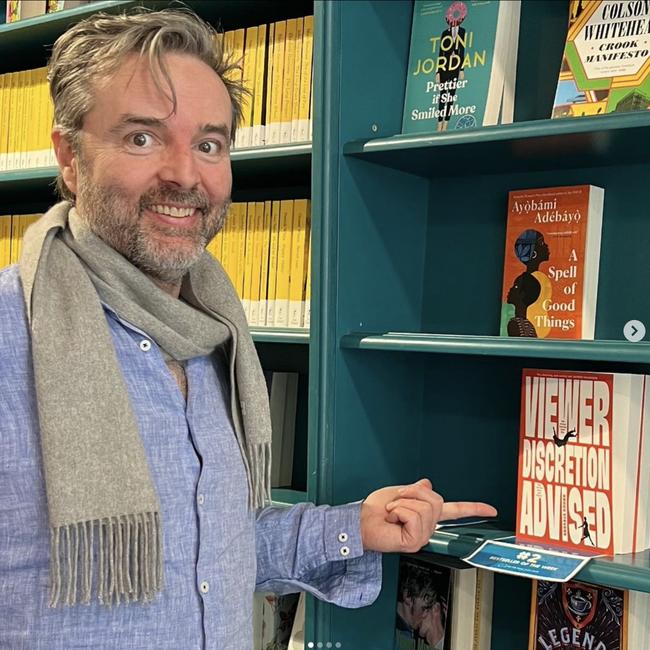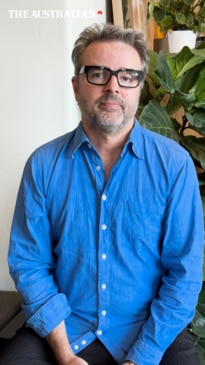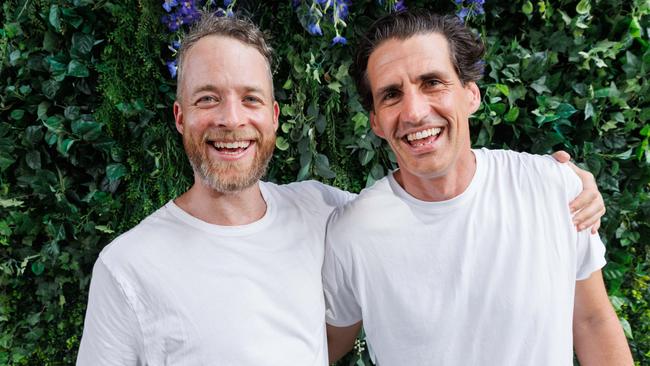How letting go augments reality for Start Beyond founder Angus Stevens
It has taken more than a decade and a half for Angus Stevens to summon the courage to talk publicly about the horror of the day he came close to death while fulfilling a dream of flying.

Byron Bay is home to some of the most scenic hang gliding sites in Australia.
In February 2006, Angus Stevens decided to celebrate his 32nd birthday with a couple of mates doing a tandem flight over Cape Byron and Lennox Heads with a qualified instructor.
That morning his partner, internationally recognised film producer Samantha Jennings – who then was six months pregnant with their second child – wished him good luck in fulfilling his dream of finally flying.
What happened next was something from their worst nightmare.
“Because it was a tandem thing, you’ve got this sort of sleeping bag that’s attached to the other bag. We took off. But the instructor guy had not attached me to the hang glider. So I was just holding on to the glider’s crossbar. Then I just thought, ‘Wow, OK. This is it,” he now recalls.
It has taken more than a decade and a half for Stevens to summon the courage and composure to talk publicly about the horrific events of that day.
The five seconds he spent confronting the shocking reality that he was about to die, as the glider climbed to a height of more than 30 metres from the launch ramp, are still haunting to recall.
“I thought the only way that I could survive was to let go. By letting go, I mean not just physically. I also went into this kind of hyper state when my whole life flashed before me,” he says. “In part I remembered being at university, and there was this guy who had fallen three stories. But because he was so drunk and unconscious when he landed, he survived.
“So my brain just went into this mode. I remember thinking, “I’ve just got to let go, and I’ve just got to let go in that sense of wheeling myself into being unconscious. So I think that’s what saved me.”
His bleeding body was quickly recovered from the coastal scrub by two local ambulance drivers, who expected him to be dead.
Stevens still remembers little pockets of time over the next 24 hours in Tweed Heads District Hospital, when his mind was quite lucid, yet seemed a million miles away from his body.
The most difficult moment was looking his wife in the eye.
“So Sammy was there with one of our close friends and for 24 hours she was coming to terms with the idea that she was going to have a paraplegic, brain-damaged husband, while she gave birth to our second child and cared for an 18-month-old,” he says.
Two days later the Northern Star newspaper’s headline screamed: “A tourist fell this far from a hang-glider and didn’t break a bone,” next to a photo showing the height of the famous Cape Byron lighthouse.

Stevens is now a Sydney-based father of two, CEO and co-founder of award-winning, internationally recognised virtual reality (VR) and augmented reality (AR) studio Start Beyond.
But his split-second decision to release his grip on the glider’s crossbar that fateful day, along with his time in rehabilitation, galvanised him for how he now chooses to live his life and what he champions in others every day.
In Lismore hospital, Stevens found himself spending time with some very ill patients, an experience that opened his eyes to what people value most as they reflect on their own lives’ ending.
“There were three other blokes who were all over 70-something years old, and they were not well,” he says.
“I was like the novelty act, because I was the 32-year-old kid in there with a wife and a little toddler. But none of those blokes talked about work. All they talked about was family and the people they loved. That gave me an insight into what life is really about. It was an enormous privilege to get that.”

Stevens was in hospital for a week, then bedridden in Byron Bay for another few weeks. Several months later he returned to work in Sydney with a walking stick.
“I think it’s just made me be thankful for being alive,” he says.
“It just filters into every aspect of my life. If you’ve never thought you were going to die, it’s a very hard thing to express.
“But it just means that in life, when people are freaking out about stuff, you just have this perspective on it. Like, it’s bullshit. Whatever you are freaking out about, in the scheme of things, you are here. Just be grateful for that.”
Switch to video
Stevens had started his media career in writing, directing and producing television, documentaries, theatre and short films.
Following on from stints in London and Los Angeles, where he worked with Bob Geldof and Ed Sheeran, he returned to Sydney.
Fourteen months after his accident, in April 2008, he secured the role of head of video at Austereo, and for the next eight years directed and produced celebrity news and live music TV, working with artists such as Lady Gaga, Katy Perry and Taylor Swift.
He also built online entertainment channels for Hamish & Andy, Southern Cross Austereo and Nova Entertainment.
“I worked with them a lot. They are genuinely talented and genuinely nice,” Stevens says of Hamish Blake and Andy Lee, two once-in-a-generation stars of Australian radio. “I learned a lot from those guys just around creativity and being generous, but also knowing exactly where your strengths lie and being able to navigate that in a way that isn’t egotistical but at the same time is just strong.”

In 2016, Stevens shifted his focus to the creation of virtual and augmented-reality experiences because he wanted to create a business that could “move people to see the world differently, and build greater awareness and empathy”.
In May that year he co-founded a firm called Start Beyond, which today is backed by Sydney-based private equity firm Nightingale Partners.
With a combination of content creation and intuitive spatial design, Start Beyond has transformed the delivery of workplace training.
The firm has now delivered more than 1.2 million AR and VR learning experiences and works with Fortune Global 500 companies Accenture and Meta, as well as US-based VR software giant Strivr.
Most recently, Start Beyond has been engaged by supermarket giant Woolworths to roll out a national VR learning program to more than 100,000 employees.
When most people hear the term “metaverse”, Stevens says they think simply of VR or AR headsets, rather than his definition: “The internet in 3D”.
Desktop and mobile devices, he says, can now facilitate the detailed exploration of virtual models, even on traditional screens. Experiences and environments can be tailored in VR or AR formats to enhance client relationships.
“The greatest strength of VR and AR is also its weakness, because it is so immersive,” Stevens says.
“Because you have to put on the headset and be taken away, as a consumer, it means it feels like too much effort.
“But where its value lies is that everyone finds training boring, is bat shit. So in an enterprise setting where you have got to do and learn something, having this technology is the most attractive way to do it, and it is the most effective.”
He sees the future of the metaverse for Start Beyond in helping enterprise, government and tertiary institutions build a pathway for learning through its platform.
“So right now we can take 360 video, 3D models, 2D content, and we can push it out across mobile desktop and VR headsets,” he says.
“So you get a scalable solution where you’ve got all these different ways of doing immersive learning, being able to have it work both in the headset, but then also pop it on your mobile phone.
“We now have over 10,000 Australians every month using our platform for training.”
Taking up writing
Some people who have a midlife crisis buy a car. Angus Stevens wrote a book.
His first fiction title, Viewer Discretion Advised, emanated from the Covid lockdowns when he was giving thought to his own sense of self-identity and where his life was at – what it meant to be a man, a working dad, and a Gen X male growing up in the 90s.
“So through tapping into cult films of the nineties and the values of that time, I decided to write a book during Covid exploring some deep, complex themes relating to modern masculinity; what it means to be a father; to be a man,” he says.
“How contemporary men grew up entangled in a system of values that they were all told was perfectly legitimate, but was actually inherently misogynistic, chauvinistic, homophobic, and racist.”
The key character in the novel is named Adam Robinson, a married father of two who discovers an app that allows him to enter the world of his favourite films.
He plays various characters, from action heroes to rom-com leading men, enjoying the greatest experiences of his life. Until he tries to log out.
“I would say that there’s a large chunk of me in it, but it’s also a work of fiction,” Stevens says. “I really wanted the voice of the character to be authentic and the easiest way to do that was to tap into my own take on things.
“But then the characters themselves are not simply me, It is a work of art. A personal story, but with a fictitious lens.”
–
‘I now put pressure on myself to make sure that I get the most that I can out of life, because I’m so grateful for being alive. I really want to make sure that I just dive into everything’
Angus Stevens
–
Geordie Williamson, chief literary critic of The Australian, described the book as “more than a Gen X nostalgia trip”, calling it a “journey into the heart and mind of a middle-aged everyman”.
In addition to writing, on the weekends Stevens plays soccer as a member of Marrickville Football Club over 45s in Sydney, where he says “the older Greeks and South Americans took me under their wing and were just so knowledgeable and welcoming, which I needed having not played competitively since I was eight”.
“The beauty of whether it’s writing a book or playing sport or having some outlet that is unrelated to my work is absolutely critical,” he says. “It rejuvenates me and it rejuvenates my work. I encourage everyone in my team to do the same. Otherwise it’s just so easy to get tired and sad and not really understand why.”
Stevens and wife Samantha, who was named by The Hollywood Reporter in 2023 as one of the 40 most influential women in international film, had two children under five when they were married in 2008.
Given the horrific events 18 months earlier, and Stevens’ painful recovery, their wedding day was extra special.
“It was a great day,” he says with a wide, proud smile.
“I now put pressure on myself to make sure that I get the most that I can out of life, because I’m so grateful for being alive. I really want to make sure that I just dive into everything, s a father, as a husband, a businessman and a creative. I just really want to get right in there and not hold back. Because I just feel like I was given this chance. I want to make it worth something.”






To join the conversation, please log in. Don't have an account? Register
Join the conversation, you are commenting as Logout